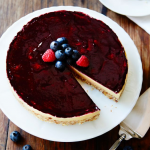Food trends… just when we think we’ve heard them all, there’s a new kid on the block claiming to be the saving grace for all health concerns. Many people are forever looking for answers – they want to know exactly what to eat and which ‘pill’ will solve everything. They are looking for a prescription, a guarantee that if they follow the rules, they’ll be ‘fixed’ once and for all.
It is understandable why food has become so confusing. One day you might read that low fat yoghurt is good for your health and the next that it’s not, and that kale is far more beneficial. One way to decipher the mixed messages is to consider if a food is nourishing, rather than healthy. Food is not actually healthy. People are or they aren’t. Food is nutritious or it isn’t. Seeing food through this lens can help us to bring more common sense and ease to food choices.
The way to not get caught up in food and nutrition fads is to remember that when it comes to food, Nature gets it right, and it is potentially human intervention that can get it so wrong. In other words, what have become known as ultra-processed foods, are not really ‘foods’ at all, often made from fake food substances and offering very little, if any, nutritional value. Yet when we choose predominantly whole, real foods, our health is rewarded from the nutrient density they provide.
Education is part of any health journey and change process. Sometimes we don’t understand what’s going on for us and we need assistance to get to the heart of it. But when we continue to seek authority, jumping from one expert to the next, without also looking inward for our own answers and paying attention to what our body is communicating through symptoms, we are doing ourselves a great disservice.
There is no one set way to approach health that works for all of us. It might suit your friend to be vegan, but when you try it, you feel completely exhausted no matter how much or how frequently you eat, and you are always iron deficient. Our body gives us messages all the time, trying to help us understand what it needs. Try to look at the symptoms you experience as messages offering you feedback about your choices. Is that headache you get most afternoons at 3pm from a lack of pain killers? (I’m joking!) Or is it your body prompting you to eat afternoon tea or up your hydration or to slow your breathing or to take a break from your computer and go outside and change your posture? When you tune in, you’ll likely hear a response bubble up, guiding you forward.
It’s your choice (of course) how you eat, whereas it’s my job to make sure people get everything they need from the way they eat. Let’s examine some common ways of eating and their subsequent potential for nutrient deficiencies:

Vegetarian
- Iron: If you’re a menstruating female, you need 18mg of iron per day. With eggs being one of the richest vegetarian sources of iron at 0.7mg of iron per egg—you can see how easily a deficiency can occur when you need 18mg every day.
- Zinc: you require 8-14mg per day. Sunflower and pumpkin seeds are some of the only vegetarian sources of zinc and they contain 0.9 mg zinc per 100 grams—taking into consideration how little seeds weigh.
Vegan
- Iron and zinc are common deficiencies (as outlined above).
- Vitamin B12: stores will generally last between two and five years, and as animal foods are the only source, supplementation is essential before stores run out.
- Calcium: if you drink caffeinated drinks or soft drinks, your requirement for calcium will be higher than if you don’t. Calcium is widely spread throughout plant foods but a focus on eating enough is important given adult women need 1000 – 1300mg per day.
- Omega 3 essential fats: the body can convert EPA (one type of essential fat) from plants into DHA (another essential fat) found in algae and fish, yet in many people this is inefficiently done. Sources of EPA include flaxseeds, chia seeds, and walnuts.
Low-Carb
- If you eat a very low-carb diet in any form, you need to ensure you obtain enough B group vitamins.
Low-Fat
- Essential fats: the omga-3 and omega-6 essential fatty acids are just that—essential!
- Fat soluble vitamins: Vitamins A, D, E and K are widely spread throughout foods that contain fat.
As you can see it’s important to ensure you are obtaining all of the nutrients your body needs for optimal health and function and in some situations where dietary intake is insufficient, supplementation is required. Zinc, for example, contributes to hundreds of processes inside your body including the creation of over 300 enzymes, many of which are necessary for great digestion, the foundation of all health. Yet this is one of the most common dietary mineral deficiencies. Obtaining adequate zinc in our diets can be a task in itself, let alone when we follow a restricted way of eating.
If you’re still asking “what am I supposed to eat?”, I gently offer you these guiding principles:
- Eat mostly whole, real foods
- Stop counting calories and if you need to count anything, count nutrients
- Consider how your food has been grown and produced—not just for your health but also for that of your family, the planet, and other animals. Get to know and thank your farmers if you can
- All whole, real foods are superstars! Try not to get caught up in food trends and fads
- Consider ‘how’ you’re eating and do your best to eat in a calm state to maximise digestion capability
- Ensure the meat you eat is organic and grass/pasture-fed, not grain-fed
- If a particular way of eating suits your body or your beliefs, ensure you are obtaining all the nutrients your body needs for optimal health and function
- Consider whether you need to supplement your nutrient intake
Allow your inner wisdom to guide your choices. Apply common sense. Be so kind to yourself and remember that it is what you do every day that impacts on your health, not what you occasionally do – hot chips twice a week has very different effects to hot chips 10 times a year. No long term, sustained change I have ever witnessed has stemmed from a headspace of deprivation.
Live each day in touch with how precious life is, how precious you are—and treat yourself accordingly.









